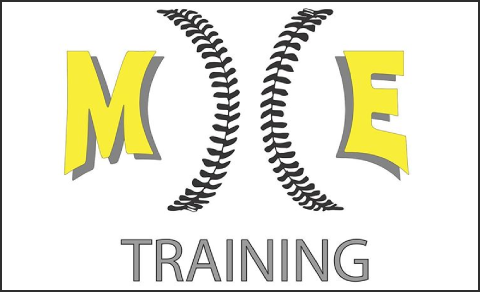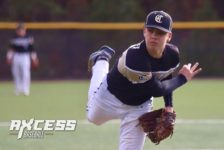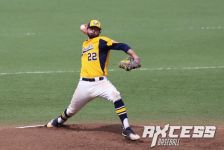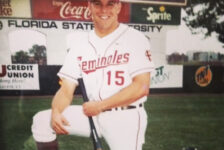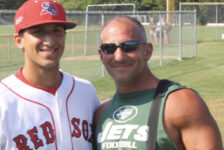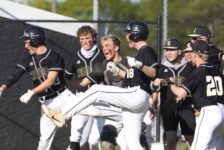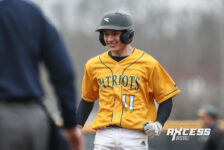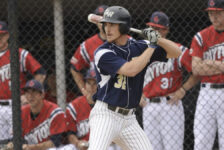Growing up in the 1990s during the peak of the Yankee dynasty, Commack native Mike Belfiore was fortunate enough to be in attendance for not one, but two World Series clinching games. Like many New Yorkers, he became infatuated with the game after watching homegrown players like Derek Jeter and Andy Pettitte transform into icons.
“It became sort of an annual thing going to the playoff games at Yankeee Stadium with my dad,” said Belfiore. Little did he know at the time, that he would later be in the big leagues with an AL East division rival of the New York Yankees during the final season of Mariano Rivera‘s career.

The early years
Belfiore was always talented for his age, but he credits the time spent with private instructors for taking his game to the next level.
“Al Chandler – who was the Smithtown coach – really helped me a lot with my swing, and I went to Rob Steinert for pitching lessons,” he said. “Later on I started going to All-Pro and worked with Scott June and Paul Gibson. I never believed in just going to one guy. I tried to combine the best knowledge and blend everything together. I think that’s super important for young kids,” he added.
On the field, Belfiore played with the Long Island Baymen – an organization I played with a couple years later. I recall looking up the Cooperstown Dreams Park record books and being astonished by the offensive records that were set by the hometown team that played right next to Lake Ronkonkoma. While some of the records have now been broken, a couple of them still stand 19 years later – and probably many years after that.
“We hold the record for 24 runs scored in the first inning without making an out and three grand slams in one innings,” he said.
That’s right. Twenty-four runs and three grand slams without recording an out! Absolutely ridiculous.
He went onto join the Long Island Titans during their first year – which was coached by Ray Babinsky and Paul Gibson. That team was absolutely loaded and featured future big leaguer Glenn Gibson, along with Dennis Donovan, Derek Squires and many others.

Commack
There has always been a rich tradition of athletics in the town of Commack. While they hadn’t won a County Championship since 1997, they had several notable players like Rick Riccobono (6th round draft pick in 1998), Pete Harnisch (1st round in 1987) not to mention one of the best sports commentators in the world in Bob Costas.
During tryouts in Belfiore’s freshman year, Head Coach Ed Boll made a list of underclassmen that would be invited to tryout for varsity and the list included only Belfiore and Bryan Bonin (current Commack coach).
“Coach Boll told my dad I would only be on varsity if I was ready to play – I wound up playing first base every day that season,” he said. Belfiore said he knew he had a good arm, but his dad told him to “save it until you need it”, meaning he wouldn’t pitch yet.
When you are playing on varsity as a freshman at a big school like Commack there could naturally be some animosity from the upperclassmen, but Belfiore noted there was none of that.
“Commack is a school with a lot of pride and history but I knew a lot of the guys in front of me. Some were family friends or neighbors so there was no animosity.”
As time went on, it was clear Belfiore was a special talent and he was beginning to garner interest from schools all over.
One particular day stood out when he began to notice that he was no ordinary left-handed pitcher and 1st baseman. That occurred at Baseball Heaven when the recruiting coordinator from Notre Dame came down to watch him.
“That was like OH MY GOD! It’s really happening – all my friends knew he was there. I had a really good game, made a couple of nice plays but then he ended up taking a job at Michigan State,” he added. That’s a situation that occurs pretty often in college baseball as assistant coaches often switch teams and could cause some issues for the players that were being recruited by them. Fortunately for Belfiore, he hadn’t made his commitment yet.
They were far from the only team interested, but most of the bigger programs like the University of North Carolina and Virginia were only interested in him as a pitcher, while he still firmly believed in his ability to hit. Belfiore noted that the ACC was where he wanted to be, so he began honing in on those schools.
The school that made the most sense was Boston College for a couple reasons. In addition to being in the ACC and being interested in him as a two-way player, his sister was attending Boston University so it made sense for the family to have both siblings in the same geographical region. He wound up committing there and going back to work at Commack looking to complete some unfinished business.
He wound up performing just about as well as you can during a northeast high school baseball season. The left-hander went 8-0 with a 0.67 ERA over 62.2 IP. He struck out 78 and walked just seven. He shutout Sachem East in the playoffs with 10 strikeouts, allowing just one hit and no walks. At the plate, he was just as dominant, batting .483 with three HR and 18 RBI. He hit five doubles, six triples and he was able to do this despite being walked 24 times.
Commack is known for not having a fence in their outfield, which definitely took away some home runs for him.
In any event, he was named the recipient of the Paul Gibson Award – which is given to the top pitcher in Suffolk County. Curiously, Glenn Gibson was named the recipient of the Carl Yastrzemski Award – given to the top overall player.
“It was kind of a weird year because Glenn won the Yaz Award and was the better pitcher and I won his dad’s award. But I was honored in that moment – it was certification that you had a great year,” he added.

Boston College
Belfiore headed to BC where he was the first baseman and designated hitter. He batted .297 with eight doubles, one triple, three HRs and 22 RBI. On the mound, he did not have much success in his seven outings. “I wasn’t really ready to pitch it was too much at that point and my fastball was about 87-89 MPH,” he said.
Things changed the next year, as Belfiore watched his team spoil a few too many late inning leads.
“I told my coach, hey I want to be out there in the ninth inning,” he said. His coach obliged and Belfiore became the closer in addition to one of their impact bats. He went 2-0 with a 2.45 ERA and eight saves in 19 games. “My mindset really changed and my velocity kept growing as I was becoming a man. My velocity and adrenaline would just increase in that role,” he said.
Following his sophomore year, he played in the prestigious Cape Cod League with the Yarmouth-Dennis Red Sox. He was originally on a temporary contract (10 days), but he was able to stay for the whole summer thanks to his performance. He was the setup man for Joe Kelly, who is in the big leagues with the World Champion Los Angeles Dodgers. He noted that the experience is amazing and he likened it to the movie “Summer Catch” which came out a few years before his time in the Cape.
When asked if he faced any notable players, he said “yeah, everyone,” only half-jokingly. As for the facilities, he said playing in the high school stadiums in the Cape was actually a downgrade from the ACC facilities and size of crowds he was used to.
All of that would pale in comparison to the magnitude of the game he played in on May 30th, 2009 when the underdogs from Boston College traveled to face No. 1 national seed Texas in the regionals.
BC had an outstanding year and entered with a record of 34-24 in large part to Belfiore but also Tony Sanchez – who would go on to become the No. 4 overall pick in the MLB Draft the next week. They had proven they could play with anyone that year – sweeping Stetson to open the season, winning two of three from Florida State, beating Clemson and Miami twice.
“We were always the underdogs but we already proved we could beat any team so why would this be any different? he said. They had won the ACC Tournament with consecutive wins over Georgia Tech and Miami to reach to NCAA Regionals.

The Best Game Ever Played
They had the misfortunate of being in a tough bracket in Texas against the top-ranked team in the country. They hung on to win their first game, 8-7, against Texas State. Their reward was a date with Texas – one of the perennial powerhouses in the country, winners of 50 games and coached by legendary HC Augie Garrido.
Belfiore was told he would have the start the next night so he began as the designated hitter. Texas took a 2-0 lead in the top of the second, but BC fought back and tied it in the bottom of the sixth. The game would stay tied, and Belfiore was told to warm up. He came in with the game knotted 2-2 in the 9th inning. Texas had brought in reliever, Austin Wood, with two outs in the seventh inning and he was dealing. Belfiore knew he needed to keep Texas off the board until his offense could scratch across a run. Problem is, that moment never came. Wood was utterly dominant, pitching 13 innings in relief, allowing two hits and striking out 14. He threw 169 pitches.
Belfiore wound up pitching 9.2 shutout innings, allowing just three hits and striking out 12. It wasn’t until the 25th inning, when Travis Tucker hit an RBI single through the right side to score Connor Rowe. The game was the longest in the history of the NCAA. It took 7 hours and 3 minutes. Some other notable facts include 683 pitches being thrown, Texas stranding 24 men on base and both teams using all of their players. The most disappointing thing, though, was that Boston College then had to bounce back in an elimination game just 11 hours later, which they were unable to do. They lost 4-3 to Army to have their season ended.
“I can’t believe people still remember it,” said Belfiore. “I still get recognized and asked to sign balls or bats from people that watched that game,” he said. Amazingly, he said a fan had taken a foul ball to the face and was taken to the hospital during the game and RETURNED to the game while it was still going on.
It’s a game that won’t be forgotten any time soon, especially for the 10,000 fans or people that cover the MLB Draft.
A debate was stirred that evening involving the responsibility of college coaches to monitor workloads. There are two sides to the argument and both feel strongly in favor of their opinion. There’s people that will say that in an elimination game, you have to do anything you can to win and both pitchers represented their team’s best chance to win. Then there’s people like Keith Law, who recently wrote a book and there’s a chapter dedicated to that game. He stated that while a college coach should have the player’s future in mind, he’s not capable of making the right decision because he faces no consequences of an overused player is hurt in the future and has their career ended. He cited that game as the most egregious example and that both players had their careers ruined that day.
Belfiore could not disagree more.
“Before that game, teams kind of looked at me as a lefty reliever. I went nine innings, so I proved to them that I could be a starter,” he added. He also said despite his pitch count of 130, his father was always on top of his use and he was never overworked.
“Had it gone to 150 pitches, I think that would’ve been different. Also I was showing no signs of injury or fatigue. Nobody could touch me. That park was so big so the home run was sort of out of play. And it was about 115 degrees on that turf so it was no problem staying loose,” he said.
In any event, the draft was the next week. Tony Sanchez of BC was selected fourth overall by the Pittsburgh Pirates and Belfiore was selected with the 45th overall pick by the Arizona Diamondback. Ironically, he noted that the Diamondbacks were not among the teams that scouted him heavily during his career.
“On draft day, he had a party at my house with friends and family. It was a surreal moment. And with my buddy getting drafted fourth overall, it was great, we had a good night,” he added.
Professional Baseball
Belfiore went to play in the minor leagues in the Diamondbacks system and was named an All-Star that season. He compiled a record of 2-2 with a 2.17 ERA over 58 innings with 55 strikeouts. After struggling in 2010 and 2011, he was dealt to the Baltimore Orioles in May 2012.
He felt it was a blessing in disguise, since he had ties to GM Dan Duquette. But the Orioles went out and signed some lefty relievers that off-season and blocked his path.
“A lot of baseball has to do with timing. Sometimes you feel like you’re the guy and then they sign someone that plays your position,” he said. He wound up performing extremely well in Double-A in 2012 and in Triple-A in 2013 and made his big league debut against the Boston Red Sox on September 27. Against his first batter, he had the pleasure of facing future Hall of Famer David Ortiz, who greeted him with a home run.
Unfortunately, that was his only big league game. He later signed with the Detroit Tigers in 2014 but was released in August 2015.
Elbow issues sidelined him and prevented him from returning to the game he loved, but his college degree in business allowed him to be prepared for the next chapter of his life. He also got married and had his first child shortly after.
“When I was playing, I was never really thinking of a fallback option, but you always try to think one or two years ahead. When things started calming down, you open your eyes to the real world,” he said. Belfiore moved to LA five years ago to work in personal investments with his father.
Does he miss it? Well, that’s a different question.
“It’s a little different out here in LA,” he laughed. “To be a high school coach you need about 10 years of big league time,” he said jokingly. In regards to coaching in the minors, he said he didn’t have the passion to work his way back up the ranks, as he did as player and that he needed to provide for his family.
Will we ever see him back on a baseball field since he’s only 33?
“To this day, my dad will still say ‘you should start throwing!”

